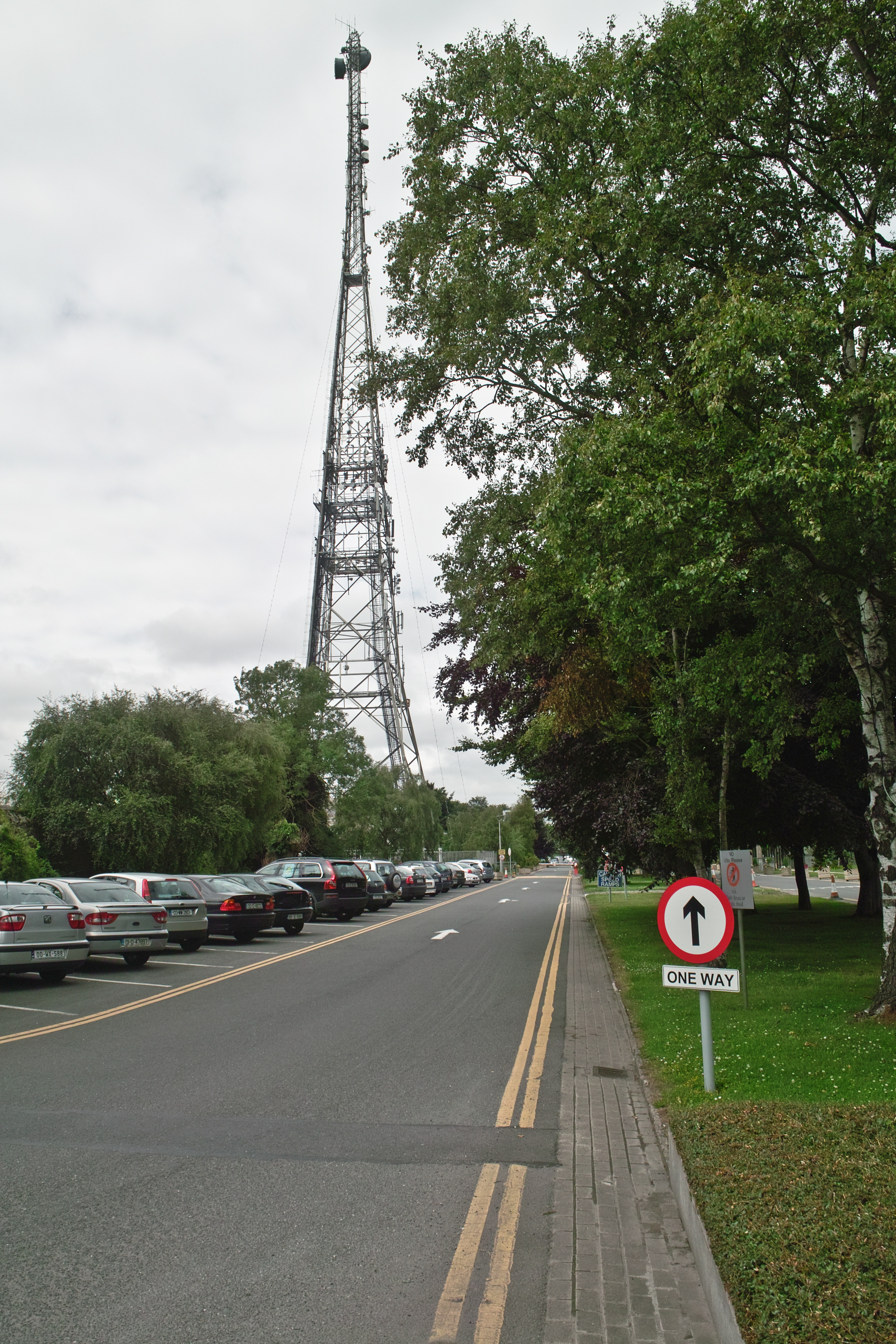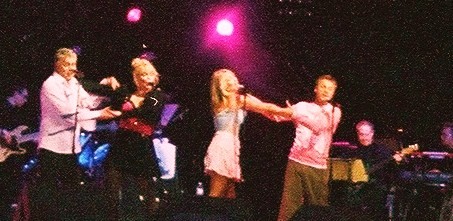|
Here Today Gone Tomorrow
Ireland was represented at the Eurovision Song Contest 1982 with the song "Here Today Gone Tomorrow", written by Sally Keating, and performed by The Duskeys. The Irish participating broadcaster, (RTÉ), selected its entry through a national final. Before Eurovision National Song Contest Eight finalists took part in the seventeenth edition of the National Contest on 14 March 1982 in Dublin, with the winner being chosen by the votes of 11 regional juries. The winners, The Duskeys, previously took part in the 1981 National Song Contest performing as 'The Duskey Sisters' placing joint 3rd. The interval act was Bucks Fizz, the 1981 British entrants and winners of Eurovision 1981. At Eurovision Ireland performed 17th. They finished 11th out of 18 with 49 points. Voting References {{Eurovision Song Contest 1982 1982 Countries in the Eurovision Song Contest 1982 Eurovision Eurovision The Eurovision Song Contest (), often known simply as Eurovision, is an ... [...More Info...] [...Related Items...] OR: [Wikipedia] [Google] [Baidu] |
RTÉ
(; ; RTÉThe É in RTÉ is pronounced as an English E () and not an Irish É ()) is an Irish public service broadcaster. It both produces and broadcasts programmes on television, radio and online. The radio service began on 1 January 1926, while regular television broadcasts began on 31 December 1961, making it one of the oldest continuously operating public service broadcasters in the world. It is headquartered in Donnybrook in Dublin, with offices across different parts of Ireland. RTÉ is a statutory body, overseen by a board appointed by the Government of Ireland, with general management in the hands of a committee of senior managers, currently an interim leadership team, headed by the Director General. RTÉ is regulated by Coimisiún na Meán. It is financed by the television licence fee and through advertising, with some of its services funded solely by advertising, while others are funded solely by the licence fee. The current network consists of 4 main TV chan ... [...More Info...] [...Related Items...] OR: [Wikipedia] [Google] [Baidu] |
The Duskeys
The Duskeys was an Irish family pop group, known for their participation in the Eurovision Song Contest 1982 with the song " Here Today Gone Tomorrow". Background Formed after the break-up of Sandy Kelly's (real name Philomena Ellis) touring showband The Fairways, she recruited her sister Barbara Ellis and Welsh cousin Nina Duskey. In 1980, they released their debut single, "Don't Feel Like Dancing". In 1981 they competed in the Irish national finals for the 1981 Eurovision Song Contest with the song "Where Does That Love Come From" under the name The Duskey Sisters. They finished in third place. A year later, they tried again and recruited a male member, Nina's brother, Dan Duskey. They performed the song "Here Today Gone Tomorrow" and this time, won the contest. This earned themselves a place in the 1982 Eurovision Song Contest and with 49 points, they came in eleventh position. The song was heavily reworked for its single release and became a hit on the Irish charts, reach ... [...More Info...] [...Related Items...] OR: [Wikipedia] [Google] [Baidu] |
Eurovision Song Contest 1982
The Eurovision Song Contest 1982 was the 27th edition of the Eurovision Song Contest. It took place in Harrogate, United Kingdom, following the country's victory at the with the song " Making Your Mind Up" by Bucks Fizz. Organised by the European Broadcasting Union (EBU) and host broadcaster British Broadcasting Corporation (BBC), the contest was held at the Harrogate International Centre on 24 April 1982 and was hosted by English television presenter and newsreader Jan Leeming. Eighteen countries took part in the contest with deciding not to enter this year. Due to internal issues, regarding a reform of telecommunications laws was left without a broadcaster responsible for its participation for the first time in history. The winner was with the song "" by Nicole. This was the first time that Germany had won the contest after having competed every year since the contest's inception. Germany received 1.61 times as many points as runner-up , which was a record under the cu ... [...More Info...] [...Related Items...] OR: [Wikipedia] [Google] [Baidu] |
Dublin
Dublin is the capital and largest city of Republic of Ireland, Ireland. Situated on Dublin Bay at the mouth of the River Liffey, it is in the Provinces of Ireland, province of Leinster, and is bordered on the south by the Dublin Mountains, part of the Wicklow Mountains range. Dublin is the largest city by population on the island of Ireland; at the 2022 census of Ireland, 2022 census, the city council area had a population of 592,713, while the city including suburbs had a population of 1,263,219, County Dublin had a population of 1,501,500. Various definitions of a metropolitan Greater Dublin Area exist. A settlement was established in the area by the Gaels during or before the 7th century, followed by the Vikings. As the Kingdom of Dublin grew, it became Ireland's principal settlement by the 12th century Anglo-Norman invasion of Ireland. The city expanded rapidly from the 17th century and was briefly the second largest in the British Empire and sixth largest in Western Europ ... [...More Info...] [...Related Items...] OR: [Wikipedia] [Google] [Baidu] |
Ireland In The Eurovision Song Contest 1981
Ireland was represented at the Eurovision Song Contest 1981 with the song "Horoscopes", composed by Jim Kelly, with lyrics by Joe Burkett, and performed by the female trio Sheeba. The Irish participating broadcaster, (RTÉ), selected its entry through a national final. In addition, RTÉ was also the host broadcaster and staged the event at the RDS Simmonscourt in Dublin, after winning the with the song "What's Another Year" by Johnny Logan. Before Eurovision National Song Contest The seventeenth edition of the National Song Contest was held on 1 March 1981 at the RTE TV Studios in Dublin, hosted by Mike Murphy. The winner was chosen by 10 regional juries. Killarney was due to announce their votes after Dublin, but due to connection problems, they had to announce their votes last. The interval act was Johnny Logan with his song "What's Another Year". Sheeba had previously appeared at the National Song Contest in 1978, while member Maxi had performed for Ireland at th ... [...More Info...] [...Related Items...] OR: [Wikipedia] [Google] [Baidu] |
Bucks Fizz
Bucks Fizz were an English pop group, that achieved success in the 1980s, most notably for winning the 1981 Eurovision Song Contest with the song " Making Your Mind Up". The group was formed in January 1981 specifically for the contest and comprised four vocalists: Bobby G, Cheryl Baker, Mike Nolan and Jay Aston. They received attention for the dance routine which accompanied the song, in which the male members of the group ripped the female members' outer skirts off to reveal much shorter mini-skirts beneath (in line with the part of the lyrics "...if you want to see some more"). The group went on to have a successful career around the world (although they were commercially unsuccessful in the United States), but the UK remained their biggest market, where they had three No.1 singles with " Making Your Mind Up" (1981), " The Land of Make Believe" (1981) and " My Camera Never Lies" (1982) and became one of the top-selling groups of the 1980s. They also had UK Top 10 hits wi ... [...More Info...] [...Related Items...] OR: [Wikipedia] [Google] [Baidu] |
Sheeba
Sheeba were an all-girl pop trio popular in Ireland in the late 1970s and early 1980s. They were Maxi, Marion Fossett and Frances Campbell. They are best known for representing the host nation, Ireland, in the Eurovision Song Contest in 1981 with "Horoscopes". Career In 1978, the group took part in the Irish National Song Contest, to select Ireland's entry for that year's Eurovision Song Contest. But they failed to win with their song, "It's Amazing What Love Can Do". They went on to release several singles in Ireland with producer Roberto Danova, although their biggest hit was "Horoscopes", which reached No.3. Following their exposure in the 1981 contest, they signed a recording contract in the UK and released the singles "The Next Night" and "Mystery", neither of these found success although were performed on UK TV shows such as 'Lena' (BBC2) and 'The UK Disco Dancing Championships' (ITV.) Exposure on the Eurovision also led to concert tours in Europe and Japan. The follow ... [...More Info...] [...Related Items...] OR: [Wikipedia] [Google] [Baidu] |
Ireland In The Eurovision Song Contest
Ireland has been represented at the Eurovision Song Contest 58 times since making its debut at the contest in Naples, missing only two contests since, in and . The current Irish participating broadcaster in the contest is (RTÉ). Ireland shares a joint record total of seven wins with , and is the only country to have won three times consecutively. Ireland has also finished second four times. Ireland's seven wins were achieved by the following songs: " All Kinds of Everything" performed by Dana (), " What's Another Year?" () and " Hold Me Now" () both by Johnny Logan, "Why Me?" by Linda Martin (), "In Your Eyes" by Niamh Kavanagh (), " Rock 'n' Roll Kids" by Paul Harrington and Charlie McGettigan (), and " The Voice" by Eimear Quinn (). Logan also wrote the 1992 winning entry. Ireland, who also finished second with "If I Could Choose" by Sean Dunphy (), " Terminal 3" by Linda Martin (), "Somewhere in Europe" by Liam Reilly (), and "Mysterious Woman" by Marc Roberts (), ... [...More Info...] [...Related Items...] OR: [Wikipedia] [Google] [Baidu] |
Countries In The Eurovision Song Contest 1982
A country is a distinct part of the world, such as a state, nation, or other political entity. When referring to a specific polity, the term "country" may refer to a sovereign state, state with limited recognition, constituent country, or dependent territory. Most sovereign states, but not all countries, are members of the United Nations. There is no universal agreement on the number of "countries" in the world, since several states have disputed sovereignty status or limited recognition, and a number of non-sovereign entities are commonly considered countries. The definition and usage of the word "country" are flexible and have changed over time. ''The Economist'' wrote in 2010 that "any attempt to find a clear definition of a country soon runs into a thicket of exceptions and anomalies." Areas much smaller than a political entity may be referred to as a "country", such as the West Country in England, "big sky country" (used in various contexts of the American West), "coal ... [...More Info...] [...Related Items...] OR: [Wikipedia] [Google] [Baidu] |
1982 In Irish Music
__NOTOC__ Year 198 (CXCVIII) was a common year starting on Sunday of the Julian calendar. At the time, it was known as the Year of the Consulship of Sergius and Gallus (or, less frequently, year 951 ''Ab urbe condita''). The denomination 198 for this year has been used since the early medieval period, when the Anno Domini calendar era became the prevalent method in Europe for naming years. Events By place Roman Empire *January 28 **Publius Septimius Geta, son of Septimius Severus, receives the title of Caesar. **Caracalla, son of Septimius Severus, is given the title of Augustus. China *Winter – Battle of Xiapi: The allied armies led by Cao Cao and Liu Bei defeat Lü Bu; afterward Cao Cao has him executed. By topic Religion * Marcus I succeeds Olympianus as Patriarch of Constantinople (until 211). Births * Lu Kai, Chinese official and general (d. 269) * Quan Cong, Chinese general and advisor (d. 249) Deaths * Li Jue, Chinese warlord and regent * ... [...More Info...] [...Related Items...] OR: [Wikipedia] [Google] [Baidu] |



